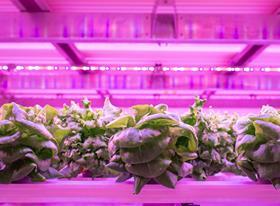
A Finnish specialist in vertical farming systemshas signed a long-term deal with sustainable engineering firm Astwood Infrastructure to build industrial-scale vertical farms in the UK.
The agreement initially covers four such farms, based “predominantly in the UK”, with plans to construct them over the next three years. It also provides a framework to build additional structures worldwide.
The agreement, which is worth over €10 million, comes as the vertical farming sector continues to expand, with predictions it will be a $10 billion industry by 2025.
Niko Kivioja, chief executive of Netled Oy,said:“We have been developing our technology for vertical farming for several years now. During this time the market for vertical farming has developed very fast.
“Now the technology and the economic figures are at the point where industrial scale vertical farms beat the traditional ways to grow leafy greens. Greenfield projects require quite massive design work for infrastructure.”
Netled designs, manufactures and sells vertical farming technology, equipment and related automation and software for vertical farming, claiming that its vertical farm Vera in Finland is the most advanced in the world.
Meanwhile, Astwood Infrastructure is a technology firm with a focus on sustainable design and engineering. For vertical farming, the company has developed its own brand, Vertivore, based on three years’ worth of research into the sector.
Astwood will be working with specialist technology providers like Netled to establish itself as an operator and supplier of vertical farming solutions.
The British company has already built and started operating a pilot facility in Redditch, Worcestershire, but the long-term focus of both Astwood and Netled is on industrial scale growing, with plans to produce millions of heads of lettuces and herbs annually.
Mike Capewell, CEO for Astwood Infrastructure,said:“We are incredibly excited about our new agreement with Netled Oy and the opportunity we now have in building and scaling a UK wide and potentially global vertical farm operation.
“Our pilot farm has shown some incredibly exciting results and we feel optimistic that we will be able to replicate this success at scale.
“As issues like rising import costs and climate change continue to advance, vertical farming systems will become critical to production, where, through the Vertivore brand, we will be able to grow sustainable, local and clean produce without being impacted by any external sources such as weather conditions or pollution.”
Astwood explained that closed vertical farming systems, like the one it is piloting in Redditch, have the advantage of being protected from extreme weather conditions, pollution and any lack of fresh water resources.
As a result, they make growing possible in areas where traditional vegetable production is impossible, and fresh water access is limited, while also supposedly improving quality, production speed and yield.






No comments yet